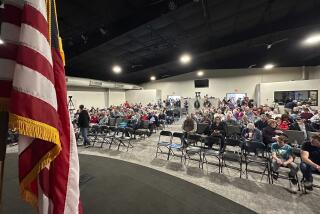Brown Wins Vermont Caucuses; Clinton 3rd : Democrats: The Californian, with 47% of the vote, adds to his momentum. Uncommitted delegates finish second with 25%.
- Share via
NEW YORK — Former California Gov. Edmund G. (Jerry) Brown Jr. handily won the Vermont Democratic caucuses Tuesday, giving another boost to his late-blooming bid for the Democratic presidential nomination.
The Democratic front-runner, Arkansas Gov. Bill Clinton, ran third. He lost not only to Brown, but his backers were outnumbered by those wanting to send uncommitted delegates to the party’s national convention.
With 93% of Vermont’s caucus precincts reporting, Brown had 47% of the vote, uncommitted delegates had 25% and Clinton had 17%. Former Massachusetts Sen. Paul E. Tsongas, who suspended his candidacy March 19, won 9%, while other candidates split the remaining 2%.
The impact of the Vermont contest is dwarfed by the significance of Democratic primaries next Tuesday in New York, Wisconsin and Kansas, in which 362 of the 2,145 delegates needed for the nomination are at stake.
Brown’s victory had virtually no impact on Clinton’s huge lead in delegates. Brown garnered 6 delegates in Vermont, giving him an estimated total of 159. Clinton won 3 delegates, giving him an estimated 1,018.
Nevertheless, Brown’s triumph should continue the momentum he gained on March 24 in Connecticut, where his upset victory in that state’s primary blocked what had appeared a clear path for Clinton toward the nomination.
Brown’s Vermont victory, like his previous strong showings in the Maine and Nevada caucuses, also demonstrated his appeal to liberal activists who remain a key segment of the Democratic electorate. Along with dominating caucuses, these liberals often play a major role in several states with primaries, including New York and Wisconsin.
As for Clinton, the Vermont results underscore the difficulties he has encountered in the Northeast. Clinton’s backers had explained his previous losses in New Hampshire, Maine, Rhode Island and Massachusetts by noting that he was competing against Tsongas, a popular native son of the region. But with Tsongas having suspended his candidacy, that explanation has lost its force.
Brown, commenting on his Vermont victory, said Tuesday night: “That’s a strong showing and I’m very pleased.”
Clinton’s campaign had sought to discount the candidate’s chances in Vermont. In line with that effort, Clinton reacted to the results by saying: “I’m elated if we got 3 delegates. I’m surprised and pleased.”
Clinton also said he thought Brown’s success showed that his message stressing “the corruption of the system” has strong appeal in New England, which has been hard hit by the recession. Clinton added that, in such an environment, Brown “inflames people with simple solutions to complicated problems.”
One advantage Brown enjoyed in Vermont was the state’s tradition of supporting maverick candidates. It is represented in the House by the chamber’s only socialist--Bernard Sanders. Another socialist, Peter Clavelle, succeeded Sanders as mayor of Burlington, the state’s largest city.
In presidential campaigns, the liberal inclinations of Vermont Democrats are accentuated by the caucus process. The relatively small number of activists who attend the gatherings tend to be even more liberal than rank-and-file party members.
Brown also was expected to benefit from his focus on environmental issues, which traditionally have ranked among the major concerns of Democratic caucus participants.
The Clinton forces, as in most states, were hoping that backing from the state party hierarchy would translate into votes. Those supporting Clinton included Vermont Gov. Howard Dean and his predecessor, Madeleine M. Kunin.
Brown, by contrast, visited Vermont on Sunday, drawing large crowds in Burlington and Montpelier. Brown’s appearances garnered him front-page coverage in several of the state’s newspapers, and a headline in one of them aptly summed up his message. “Brown Tells Vermonters He’s Fed Up,” it said.
But the reaction to Brown was not completely positive. An editorial in the Barre-Montpelier Times-Argus said: “Vermonters are cautioned to handle (Brown) with care. His calling card is outrage, his style is slash and burn, his salient feature is hypocrisy, and his regard for the truth is suspect.”
Vermont Republicans also held caucuses Tuesday, their first step in selecting 19 delegates to the GOP national convention. President Bush was unchallenged in the state.
Times staff writers Douglas Jehl and Sam Fulwood III contributed to this story.
The Vote in Vermont
DEMOCRATS: 93% of precincts reporting
Dele- Vote % gates Jerry Brown 573 47 6 Bill Clinton 208 17 3 Paul Tsongas 117 9 0 Uncommitted 311 25 4 Others 27 2 0
REPUBLICANS: President Bush was unchallenged.
More to Read
Get the L.A. Times Politics newsletter
Deeply reported insights into legislation, politics and policy from Sacramento, Washington and beyond. In your inbox twice per week.
You may occasionally receive promotional content from the Los Angeles Times.










